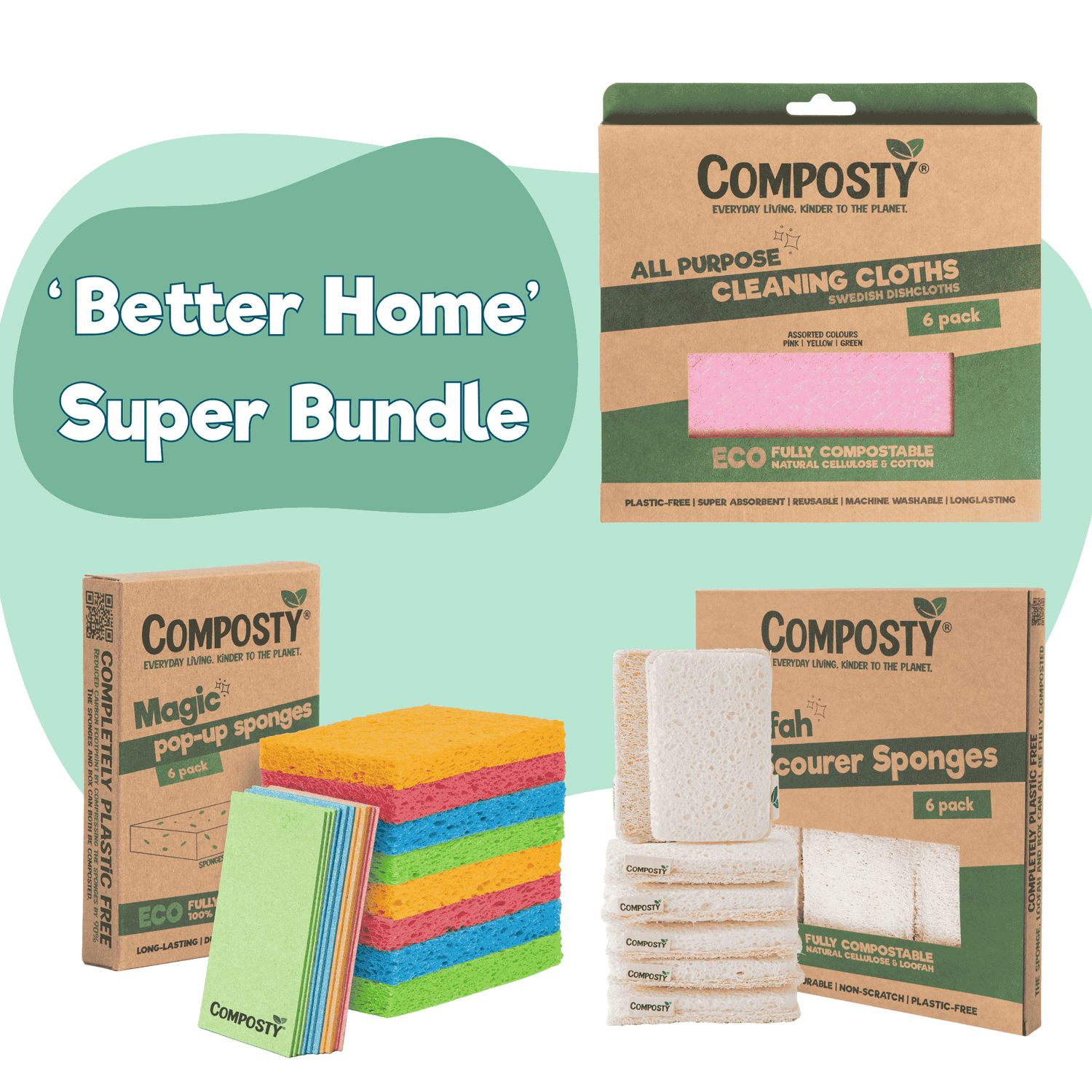
3 Hidden Kitchen Items That Are Polluting Your Food (And Your Body)
Did you know your kitchen could be quietly contributing to plastic pollution—not just in the environment, but in your own body?
From the chopping board you use for veggies, to the sponge you use to scrub your sink, everyday kitchen items can shed microscopic plastic particles. These microplastics are sneaking into our food, our water, and ultimately, into our bodies.
It sounds dramatic—but the science backs it up. And the most shocking part? These microplastics are now showing up in our blood, lungs… even in breast milk.
Let’s take a closer look at the everyday culprits in your kitchen—and the simple swaps you can make to protect your family and the planet.
Microplastic Pollution in the Kitchen: 3 Everyday Items to Watch Out For
1. Non-Stick Pans
That flaking coating on your old frying pan? It could be PTFE or PFOA—chemicals used in non-stick cookware (think Teflon). When these coatings get scratched or worn, they can shed microscopic particles that end up in your food.
🛑 Why it matters: These particles can release toxic compounds when heated. PFOA has been linked to thyroid issues, immune system disruption, and even some cancers (source: American Cancer Society).
✅ Swap it for: Cast iron, ceramic, or stainless steel pans. They last longer, are safer, and don’t shed invisible plastics into your stir-fry.
2. Plastic Chopping Boards
Every chop leaves behind tiny grooves in plastic chopping boards—little micro highways for bacteria and a hotspot for plastic particle shedding. Over time, these bits make their way into your food and down your drain.
🛑 Why it matters: Those plastic fragments don’t break down in your body. They can enter your digestive tract and possibly even your bloodstream (source: National Institutes of Health).
✅ Swap it for: Bamboo chopping boards – they’re naturally antimicrobial, durable, and totally plastic-free.
3. Plastic Sponges
Each time you scrub, synthetic sponges shed tiny plastic fibres. They break down quickly and are usually thrown away after a few uses—heading straight for landfill, where they can linger for over 500 years.
🛑 Why it matters: Those microplastic fibres can flow down your sink and into waterways, or worse—get into your food prep surfaces (source: National Geographic).
✅ Swap it for: Composty sponges – 100% plastic-free and home compostable in just 3 months. Better for your body, your bin, and the planet.
Why This Matters: Microplastics Are in Your Body Now
Tiny plastic particles are no longer just an environmental concern—they’re now a health issue.
Scientists have found microplastics in human blood, lungs, placentas, and even breast milk (source: The Guardian).
Health Impacts of Microplastics
While research is still ongoing, early studies suggest microplastics can:
-
Cause inflammation in the gut, liver, and other organs
-
Disrupt hormones, particularly those related to fertility, thyroid function, and metabolism
-
Carry toxic chemicals, like phthalates and BPA, into your system, potentially interfering with cell function and immunity
-
Affect brain health – emerging studies link exposure to plasticisers with cognitive and behavioural changes in children (source: WHO)
Because microplastics are so tiny, they can cross cell membranes and possibly reach places they should never be—like your brain or your unborn baby.
Most At Risk
-
Pregnant women and infants
-
Children with developing immune systems
-
People with pre-existing inflammatory or metabolic conditions
This isn’t about fear—it’s about facts. And it’s about protecting our loved ones by taking small, meaningful steps.
What Can You Do About It?
You don’t need to overhaul your life to make a difference. Just start with one drawer in your kitchen.
Here’s a cheat sheet to help you swap out the worst offenders:
| Plastic Polluter | Better Swap |
|---|---|
| Non-stick pans | Cast iron, ceramic, or stainless steel |
| Plastic chopping boards | Bamboo or wood (oiled for longevity) |
| Plastic sponges | Composty sponges – compostable, plastic-free, and family-safe |
A Better Sponge for a Better Home
At Composty, we believe in creating products that are better:
-
Better for your family (no microplastics here!)
-
Better for the planet (fully compostable in 3 months)
-
Better for your wallet (our 12-pack lasts all year!)
Let’s put an end to kitchen pollution—one sponge at a time.
Final Thought
Scientists are still uncovering the long-term effects of microplastics—but the message is already clear:
Less plastic = better for your body.
You don't need to be perfect. But every swap you make is a step towards a healthier home and a cleaner planet.
Ready to make the better choice?
Check out our Composty Sponges – the sponge that scrubs without the microplastics.

